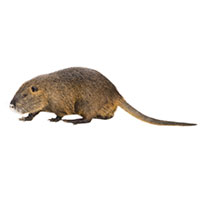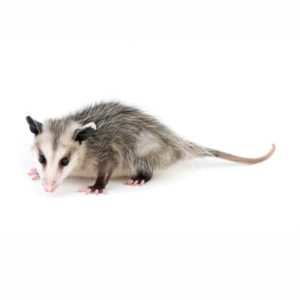Raccoon Diet
Raccoons are omnivores and stick to a balanced diet of plants, insects, and small mammals. Some food sources include beetle larvae, berries, nuts, apples, fungi, earthworms, crayfish, pet food, mice, rabbits, and squirrels. Gardens, especially ones containing sweetcorn, are another prime target for the pests. In urban areas, where their natural food sources are limited, raccoons are notorious for scavenging trash and compost.
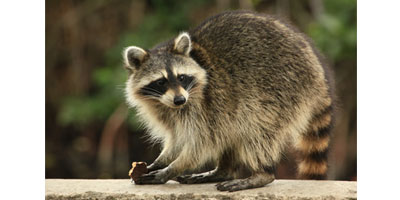
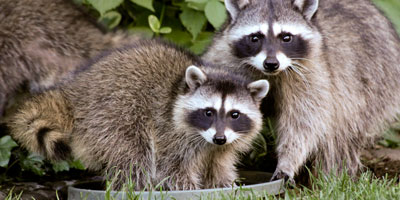
Raccoon Habitat
Raccoons are extremely adaptable. Typically, raccoons live in heavily wooded areas near trees, water, and abundant vegetation, making their dens in the hollow parts of trees or abandoned burrows. In suburban and urban areas, they make their homes in man-made structures like attics, sewers, barns, and sheds.
Raccoon Life Cycle
Raccoon mating season starts in late winter and stretches to the late spring months. Females will mate with several males before the season is over. As raccoons prefer to dwell in dens and similar spaces, they often settle in rock crevices, tree cavities, caves, farm buildings, storm sewers, hollow logs, and chimneys to give birth and raise the young. An average raccoon litter produces three to five offspring, though the mammal is capable of having up to seven cubs at a time. The gestation period lasts about 63 days, and it takes another two to four months to wean the cubs. Mothers are very protective of their young until they separate after about a year. Adults live in loose-knit communities of four or five raccoons for better protection against predators. Raccoons have been known to live for 17 years, though few live past six years of age due to the many dangers and potential problems encountered in the wild.
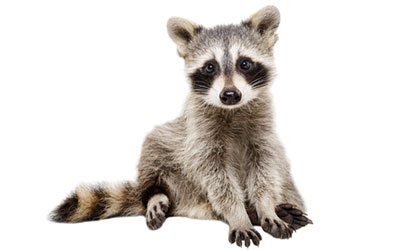
Signs of a Raccoon Infestation
- Yard Damage: Overturned turf as a result of grubbing
- Crop Damage: Chewed sweet corn, hollowed-out watermelons
- Sightings: The sighting of an adult raccoon
- Odor: Unpleasant odors produced by urine and feces
- Property Damage: Damage to shingles, rooftop ventilators, or attic insulation
- Trash: The disruption of trash cans usually indicates the presence of the pest
Raccoon Damage
Raccoons can be extremely destructive due to their curiosity, intelligence, dexterity, and climbing skills.
Health Risks & Diseases
Raccoons pose threats to the health and well-being of humans and household pets, as well as gardens and lawns because they carry diseases – either themselves or from the parasites on their bodies. The pests are known vectors of several diseases transferable to humans. While rabies serves as the most notable and common threat raccoons pose to human health, the animals also carry leptospirosis, Chagas disease, and tularemia. Additionally, raccoons are often infested with ticks and fleas, which can be transferred to pets.
Property Damage
Property damage caused by raccoons is most commonly due to their desire to get food and seeking shelter. A raccoon will often try to find shelter in attics and other areas in your home. To get into attics, chimneys, and other den-like areas of homes, raccoons tend to cause structural damage by shredding insulation, prying off singles and fascia boards, and breaking vent covers and windows. Garbage cans, containers, and other structures can be torn apart by their very strong hands that are each topped with strong, non-retractable claws.
Lawn Damage
Given that raccoons like to dig for grubs and beetles and other insects, they might also dig up your garden. They are opportunistic eaters and might eat plants, vegetables, and fruit that you are growing in your garden.
Dangers
Social and aggressive when cornered, raccoons pose many problems to people and house pets. With sharp nails and long, slender feet, the pest is a skilled scavenger and climber and easily transmits diseases through scratches and bites.
Raccoon Prevention & Control
Raccoon Prevention
Simple preventative steps and minor repairs will discourage raccoons and other pests from invading your property.
Secure Trash Cans
Wisconsin homeowners may limit raccoon food sources by making sure all trash receptacles have secure lids. To prevent the containers from tipping over, residents should consider binding trash cans to posts with wire or cords.
Habitat Modification
Like most pests, invading raccoons are looking for areas that provide shelter, food, and water. Therefore, limiting access to the basic necessities effectively prevents the pests from settling in homes.
Limit Food & Shelter
Bringing in any outdoor pet food and water and purchasing special fences for gardens also deters raccoons from hanging around the house. To limit options for shelter, homeowners should consider eliminating tree branches that hang over roofs.
Exclusion
Covering chimneys with fire code-appropriate caps remains an effective way of keeping raccoons from nesting.
Landscaping
Thinning overgrown shrubs, removing woodpiles, and fixing holes that lead under porch areas also reduces the chances of a raccoon infestation.
Raccoon Control
Much in wildlife control is about knowing and understanding breeding cycles. For raccoons, exclusion is a key element in solving the problem, but a nesting mother can create tremendous damage attempting to get back in if separated from her nest. Raccoons are easily frightened and may quickly become aggressive when approached by humans.
Batzner Pest Control uses insight on raccoon biology and behavior to approach raccoon control humanely and effectively with the following steps:
- Identifying raccoon entry points: First things first, your specialist uncovers how raccoons are getting in.
- Raccoon removal: We then take a safe, ethical approach to removing them.
- Keeping raccoons out: Finally, your specialist will suggest repairs and exclusion techniques prevent future problems.
Methods of removal include live-trapping and exclusion. Typically, these methods require special certifications or licenses. Given the threats, the pests pose to human health, attempting to remove raccoons from the home without professional assistance is inadvisable.
As a result, homeowners should refrain from removing or attempting to remove raccoons without the help of a pest control professional. Count on a professional pest management service to take care of the problem knowledgeably and successfully.
Need help with Raccoons?
We'll call you! Leave your information below.
Pests Belong Outside!
Leave your information below and we will give you a call back.
"*" indicates required fields
*During normal business hours. After hours inquiries will be returned the next business day.


